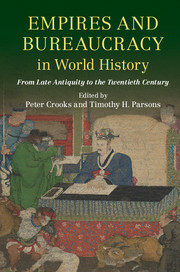Book contents
- Frontmatter
- Contents
- List of Figures
- List of Maps
- List of Tables
- List of Contributors
- Preface
- List of Abbreviations
- Part I Introduction
- Part II Empires and Bureaucracy in World-Historical Perspective
- Part III From Late Antiquity to the Middle Ages
- Part IV From the Age of European Expansion to the End of Empires
- 12 Magistrates to Administrators, Composite Monarchy to Fiscal-Military Empire: Empire and Bureaucracy in the Spanish Monarchy, c.1492–1825
- 13 Britain's Overseas Empire before 1780: Overwhelmingly Successful and Bureaucratically Challenged
- 14 ‘Les Enfants du Siècle’: An Empire of Young Professionals and the Creation of a Bureaucratic, Imperial Ethos in Napoleonic Europe
- 15 Bureaucracy, Power and Violence in Colonial India: The Role of Indian Subalterns
- 16 From Chief to Technocrat: Labour and Colonial Authority in Post–World War II Africa
- 17 The Unintended Consequences of Bureaucratic ‘Modernization’ in Post–World War II British Africa
- Part V Afterword
- Index
12 - Magistrates to Administrators, Composite Monarchy to Fiscal-Military Empire: Empire and Bureaucracy in the Spanish Monarchy, c.1492–1825
from Part IV - From the Age of European Expansion to the End of Empires
Published online by Cambridge University Press: 05 August 2016
- Frontmatter
- Contents
- List of Figures
- List of Maps
- List of Tables
- List of Contributors
- Preface
- List of Abbreviations
- Part I Introduction
- Part II Empires and Bureaucracy in World-Historical Perspective
- Part III From Late Antiquity to the Middle Ages
- Part IV From the Age of European Expansion to the End of Empires
- 12 Magistrates to Administrators, Composite Monarchy to Fiscal-Military Empire: Empire and Bureaucracy in the Spanish Monarchy, c.1492–1825
- 13 Britain's Overseas Empire before 1780: Overwhelmingly Successful and Bureaucratically Challenged
- 14 ‘Les Enfants du Siècle’: An Empire of Young Professionals and the Creation of a Bureaucratic, Imperial Ethos in Napoleonic Europe
- 15 Bureaucracy, Power and Violence in Colonial India: The Role of Indian Subalterns
- 16 From Chief to Technocrat: Labour and Colonial Authority in Post–World War II Africa
- 17 The Unintended Consequences of Bureaucratic ‘Modernization’ in Post–World War II British Africa
- Part V Afterword
- Index
Summary
Between 1492 and 1600, Spain acquired a remarkable overseas empire in the Caribbean, mainland America and the Pacific. Discovery and conquest were by no means complete by 1600: indeed, the Spanish empire was still expanding in mainland America in the eighteenth century. Nevertheless, Spanish America was already substantial by 1600 (Map 12.1). At the same time, Spain was extending its overseas dominion nearer to home, in North Africa, Italy and the Low Countries (Flanders). These acquisitions, creating the largest empire Europe had known to date, and the first real European maritime or overseas empire, represented a number of major challenges for Spain's monarchs and ministers, including how to administer them and ensure obedience and loyalty at such a distance.
This was especially true of the newly acquired transatlantic dominions: whereas it took just two to three weeks for a letter from Madrid to reach Brussels in Spanish Flanders, it took between two and eight months for a letter to reach New Spain, and twelve months to reach the Philippines. For many historians, the elaboration of an imperial machinery was one of the great Spanish successes of the sixteenth century. Indeed, among the enduring images of King Philip II of Spain (d. 1598) is that of the king as bureaucrat, sitting at his desk in the palace of the Escorial reading and signing great numbers of state papers produced by that administration, although for many historians the latter was one more element in the so-called black legend of Spanish imperial government, which is invariably contrasted with the supposedly more beneficent British model and legacy in the Americas.
Spain in this period is invariably described by historians as ‘imperial’, and the collection of territories ruled from Spain as an ‘empire’. There is some justification for this. Those territories and their inhabitants were governed from Spain, often by Spaniards, in accordance with policy objectives formulated in Spain, and were regarded as offering resources to be exploited by and for Spain and its rulers. In that sense, there was a Spanish empire, as ‘empire’ is defined by Michael Doyle:
Empire is a relationship, formal or informal, in which one state controls the effective political sovereignty of another political society. It can be achieved by force, by political collaboration, by economic, social or cultural dependence. Imperialism is simply the process or policy of establishing or maintaining an empire.
- Type
- Chapter
- Information
- Empires and Bureaucracy in World HistoryFrom Late Antiquity to the Twentieth Century, pp. 291 - 317Publisher: Cambridge University PressPrint publication year: 2016
- 4
- Cited by

